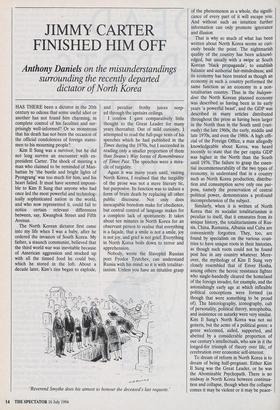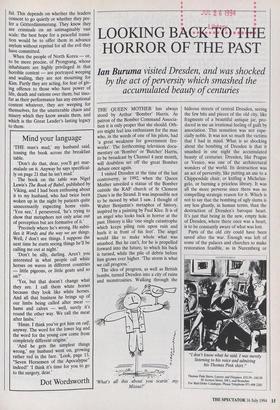JIMMY CARTER FINISHED HIM OFF
Anthony Daniels on the misunderstandings
surrounding the recently departed dictator of North Korea
HAS THERE been a dictator in the 20th century so odious that some useful idiot or another has not found him charming, in complete control of his faculties and sur- prisingly well-informed? Or so monstrous that his death has not been the occasion of the official condolences of foreign states- men to his mourning people?
Kim II Sung was a survivor, but he did not long survive an encounter with ex- president Carter. The shock of meeting a man who claimed to be reminded of Man- hattan by 'the bustle and bright lights of Pyongyang' was too much for him, and his heart failed. It must have seemed impossi- ble to Kim II Sung that anyone who had once led the most powerful and technolog- ically sophisticated nation in the world, and who now represented it, could fail to notice certain relevant differences between, say, Kwangbok Street and Fifth Avenue.
The North Korean dictator first came into my life when I was a baby, after he ordered the invasion of South Korea. My father, a staunch communist, believed that the third world war was inevitable because of American aggression and stocked up with all the tinned food he could buy, which he stored in the loft. About a decade later. Kim's tins began to explode, and peculiar frothy juices seep- ed through the upstairs ceilings.
I confess I gave comparatively little thought to the Great Leader for many years thereafter. Out of mild curiosity, I attempted to read the full-page texts of his speeches which he had published in the Times during the 1970s, but I succeeded in reading only a smaller proportion of them than Swann 'S Way forms of Remembrance of Times Past. The speeches were a mira- cle of turgidity.
Again it was many years until, visiting North Korea, I realised that the turgidity of the prose was not a mere literary tic, but purposive. Its function was to induce a form of brain death by replacing all other public discourse. Not only does inescapable boredom make for' obedience, but central control of language makes for a complete lack of spontaneity. It takes about ten minutes in North Korea for an observant person to realise that everything is a façade, that a smile is not a smile, joy is not joy, and grief is not grief. Everything in North Korea boils down to terror and apprehension.
Nobody, wrote the Slavophil Russian poet Fyodor Tyutchev, can understand Russia with his mind: so it is with totalitar- ianism. Unless you have an intuitive grasp 'Reverend Smythe does his utmost to honour the deceased's last requests.' of the phenomenon as a whole, the signifi- cance of every part of it will escape you. And without such an intuition further information can only promote ignorance and illusion.
That is why so much of what has been written about North Korea seems so curi- ously beside the point. The nightmarish quality of the country has been acknowl- edged, but usually with a swipe at South Korean 'black propaganda', to establish balance and authorial fair-mindedness; and its economy has been treated as though an economy in such a country performed the same function as an economy in a non- totalitarian country. Thus in the Indepen- dent the North Korean planned economy was described as having been in its early years 'a powerful beast', and the GDP was described in many articles distributed throughout the press as having been larger in the North than in the South until (vari- ously) the late 1960s, the early, middle and late 1970s, and even the 1980s. A high offi- cial of the Foreign Office, a man allegedly knowledgeable about Korea, was heard recently to state that the per capita GDP was higher in the North than the South until 1976. The failure to grasp the essen- tial incommensurability of the two types of economy, to understand that in a country such as North Korea production, distribu- tion and consumption serve only one pur- pose, namely the preservation of central political power, demonstrates a profound incomprehension of the subject.
Similarly, when it is written of North Korea that its socialist totalitarianism is peculiar to itself, that it emanates from its unique history, the totalitarianisms of Rus- sia, China, Rumania, Albania and Cuba are conveniently forgotten. They, too, are found by specialists on the various coun- tries to have unique roots in their histories, as though such roots could not be found post hoc in any country whatever. More- over, the mythology of Kim Il Sung very closely resembled that of Enver Hoxha, among others: the heroic resistance fighter who single-handedly cleared the homeland of the foreign invader, for example, and the astonishingly early age at which inflexible political conceptions were formed (as though that were something to be proud of). The historiography, iconography, cult of personality, political theory, xenophobia, and insistence on autarky were very similar. Kim Ii Sung's North Korea was not sui generis, but the acme of a political genre: a genre welcomed, aided, supported, and abetted by a considerable proportion of our century's intellectuals, who saw in it the longed-for triumph of theory over life, of cerebration over economic self-interest.
To dream of reform in North Korea is to dream of being half-pregnant. Either Kim II Sung was the Great Leader, or he was the Abominable Psychopath. There is no midway in North Korea between continua- tion and collapse, though when the collapse comes it may be violent or it may be peace- ful. This depends on whether the leaders consent to go quietly or whether they pre- fer a GOtterdammerung. They know they are criminals on an unimaginably vast scale: the best hope for a peaceful transi- tion would be to offer them in advance asylum without reprisal for all the evil they have committed.
When the people of North Korea — or, to be more precise, of Pyongyang, whose inhabitants are highly privileged in that horrible context — are portrayed weeping and wailing, they are not mourning for Kim. Partly they are acting, for fear of giv- ing offence to those who have power of life, death and rations over them; but inso- far as their performance has any emotional content whatever, they are weeping for themselves, for the unutterable chaos and misery which they know awaits them, and which is the Great Leader's lasting legacy to them.



















































 Previous page
Previous page